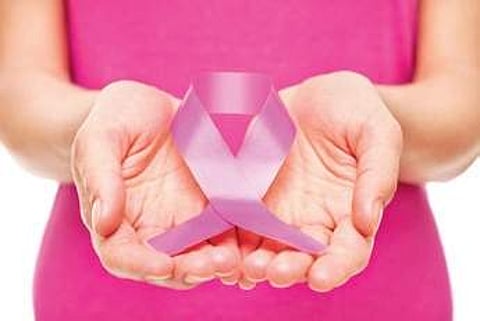

CHENNAI: The incidence of breast cancer among women in Chennai has seen a significant increase, according to data from a first-of-its-kind report compiled by the Adyar Cancer Institute and the State Health Department. Experts cited lifestyle changes as one of the factors behind the rise and urged women above the age of 30 to go for regular examinations to screen for breast cancer.
The Tamil Nadu Cancer Registry report, compiled for 2012-2015, showed that the Crude Incidence Rate (CIR) of breast cancer among women in Chennai was 47.7 for one lakh population of women. The CIR refers to the number of cases occurring in a specified population in a year.
In contrast, the report, which is to be published in a month, showed that the CIR for Kanniyakumari district is 31.7 per lakh population of women while the figure for the whole State is only 20.7. The Cancer Statistics-2015 by sex showed that the CIR of breast cancer was 22.7 among the 8,706 women surveyed. The CIR of cervical cancer was 17.7 for the 6,788 surveyed women, while it was 4.9 for ovarian cancer among the 1,891 women participants.
“We have finished compiling of the data and it will be published in a month,” said Dr P Sampath, statistician, Adyar Cancer Institute.Dr Sampath also cited data from the ICMR’s National Cancer Registry Programme 2020 which showed that in Chennai, 52 people in one lakh population got breast cancer, two-fold increase from a decade ago when it was only 26 or 27 per lakh population.
According to the Adyar Cancer Institute’s assistant director Dr R Swaminathan, there are multiple factors that contribute to breast cancer. “The increasing trend is seen not only in urban areas but also in rural areas. This could be because of more urbanisation of rural areas,” Dr Sampath said in a statement.Explaining that the reproductive profile of women had changed in the last 30 years, Dr Swaminathan said late marriage, late childbirth and reduction in breastfeeding are some of the obvious explanations.
“The only way forward is that women over the age of 30 undergo basic breast screening. We cannot prevent the cancer, but we can detect it early,” he said. To ensure more women get screened, he suggested that there could be a clause before availing health insurance that the claimant should have undergone screening for cancer.
Dr Naveen Ravel, head of the department of Medical Oncology, Government Stanley Medical College Hospital, added that women over the age of 40 must undergo mammograms since there won’t be any pain or discolouration in the early stages.